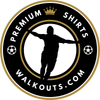Middlesbrough Football Club, based in Middlesbrough, North Yorkshire, compete in the EFL Championship and were formed on 1 January 1876. At Walkouts we curate certified and signed items that reflect the club’s long professional history, with an emphasis on provenance and verified signatures for fans and collectors.
The club have called the Riverside Stadium home since the move from Ayresome Park, and that continuity matters to kit historians and collectors. Shirts from the Ayresome Park era and early Riverside seasons show distinct kit details and supply marks that help verify era and issue, making them sought after for framed displays and period collections.
Middlesbrough’s modern honours include victory in the League Cup 2004 and a run to the UEFA Cup final 2006, milestones that lift certain match and commemorative shirts above routine retail issues. The club’s recovery under Steve Gibson and on-field management by Steve McClaren are well documented, and the club is ranked 501 by IFFHS, a data point used by some archivists to contextualise modern performance.
Collector interest often centres on special releases. The club marked milestones with anniversary shirts such as the Centenary 1976 commemorative crest and later 125 year releases, and these post-1970 anniversary pieces attract buyers seeking clear provenance and distinctive badges or sleeve work.
Season magnets include shirts from the 2003-04 season when silverware returned and the white away 2005-06 set that accompanied the UEFA Cup campaign, while cult designs from the 1996-97 double finals year also draw attention for their association with high-profile fixtures. These seasons are chased because they combine memorable results, visible wear in match-issued examples, and photographic records that help authenticate provenance.
Signed retail demand is strong for fanshop shirts as well as player-issue variants, collectors seek early runs, limited retail editions and region-specific releases alongside match-issued examples, and many listings include a COA or similar provenance note. Verification details, maker era notes for suppliers such as Erreà and Adidas, and visible stitching differences are routinely cited when distinguishing retail from match-worn shirts, and we offer Free worldwide shipping on eligible orders.
For those researching specific pieces, items tied to the League Cup campaign and the European run carry particularly rich evidence trails, with photographic match records and press images helping to confirm usage. Look for framing provenance and supplier era identifiers when comparing shirts from the 2003-04 season and the white away 2005-06 UEFA Cup campaign, and finish your search at Walkouts for verified, well-documented Middlesbrough signed football shirts and memorabilia.







